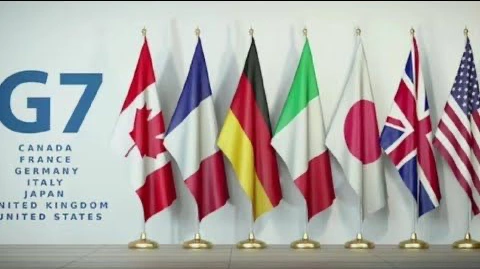Stock Market Posts on Crowch
In June 2025, Canada will host the annual G7 Summit, one of the most influential gatherings of global leaders. The heads of the seven largest advanced economies will come together to address pressing global issues, from climate and security to artificial intelligence and economic recovery.
What Is the G7
The Group of Seven includes: Canada, the United States, the United Kingdom, Germany, France, Italy, and Japan. Together, these countries represent roughly 40% of global GDP and lead in innovation, finance, trade, and diplomacy.
The G7 is known for its informal and direct approach. Unlike formal organizations, it has no permanent headquarters or binding agreements. Instead, it enables open dialogue and rapid response to global developments.
Key Topics in 2025
- Global economy & inflation: coordinated efforts to curb inflation, support supply chains, reduce inequality
- Security & geopolitics: war in Ukraine, policy alignment on China, cyber defense strategies
- Climate change: decarbonization targets, green investment plans, energy transition
- Artificial intelligence & tech: regulating AI, safeguarding data, strengthening digital infrastructure
- Global health: pandemic preparedness, post-COVID reforms, aid to low-income nations

Special attention will also be paid to partnerships with emerging countries in Africa and Asia, as well as reinforcing global institutions such as the WHO, WTO, and IMF.
Why It Matters

The G7 is where global priorities are shaped. Initiatives launched here often guide larger platforms like the G20 or the UN. As host, Canada aims to highlight democratic unity, responsible leadership, and cooperation in times of global tension.
The 2025 summit will take place against a backdrop of uncertainty — geopolitical instability, climate crises, and rapid tech disruption. The decisions made in Canada will influence international policies and potentially reshape the global order.
In recent years, the word "ecology" has stopped being something abstract. Wildfires, droughts, abnormal rains, heatwaves in cities, disappearing forests, and shrinking rivers — we see all this not on screens, but outside our windows. Climate change is no longer a hypothesis; it’s a reality that millions of people face every day. What once seemed distant now hits close to home, affecting every aspect of modern life.
Environmental instability affects not just nature, but also the economy, politics, infrastructure, agriculture, and even mental health. Crops are failing due to heat and unpredictable seasons, which leads to food shortages and rising prices. Cities become urban heat islands, where concrete traps warmth and creates dangerous living conditions. Infrastructure that was not built to withstand these extremes begins to collapse — roads buckle, power grids overload, and buildings suffer from unexpected flooding. Access to clean, reliable water is becoming increasingly uncertain in regions that once took it for granted. In some places, communities are forced to relocate because their homes are no longer livable.
Beyond the physical consequences, there are serious psychological and emotional effects. The fear of what comes next — of an unstable future, of natural disasters, of global collapse — is growing. This is especially noticeable among the younger generation, who will inherit the consequences of today’s inaction. Psychologists now recognize "climate anxiety" as a legitimate condition: a persistent feeling of helplessness, dread, and sadness connected to ecological change. It’s not irrational — it’s a rational response to what people see and feel every day.

Meanwhile, governments and corporations often issue bold climate-related statements. Commitments to reduce emissions, transition to green energy, or preserve forests are announced at international summits and celebrated in the media. But on the ground, progress is slow. Promises are postponed, diluted, or undermined by political pressure, economic interests, or lack of coordination. Many people feel disillusioned and frustrated, realizing that declarations are not the same as meaningful action.
There is a growing understanding that time is running out. The opportunity to avoid the worst impacts of climate change is still there, but it is shrinking rapidly. The coming decade is critical — not only for reducing emissions, but for fundamentally changing how societies function. The world is entering an era of climate responsibility, and each of us plays a role in what that looks like.
The solution is not only about innovation and technology — though clean energy, carbon capture, and sustainable agriculture are all vital. It’s also about our daily choices. What we eat, how we travel, what we buy, how much we waste, and who we support politically — these things matter. Small changes on a personal level, multiplied across millions of lives, can drive systemic change. But it requires honesty, courage, and commitment.
Mass awareness, collective pressure on businesses and political institutions, and a shift in mindset toward long-term, sustainable thinking are not signs of idealism. They are a necessary response to reality. This is not just a movement for environmentalists — it’s a survival strategy for all of humanity. The future of the planet depends on the choices we make today — and whether we are willing to act before it’s too late.
